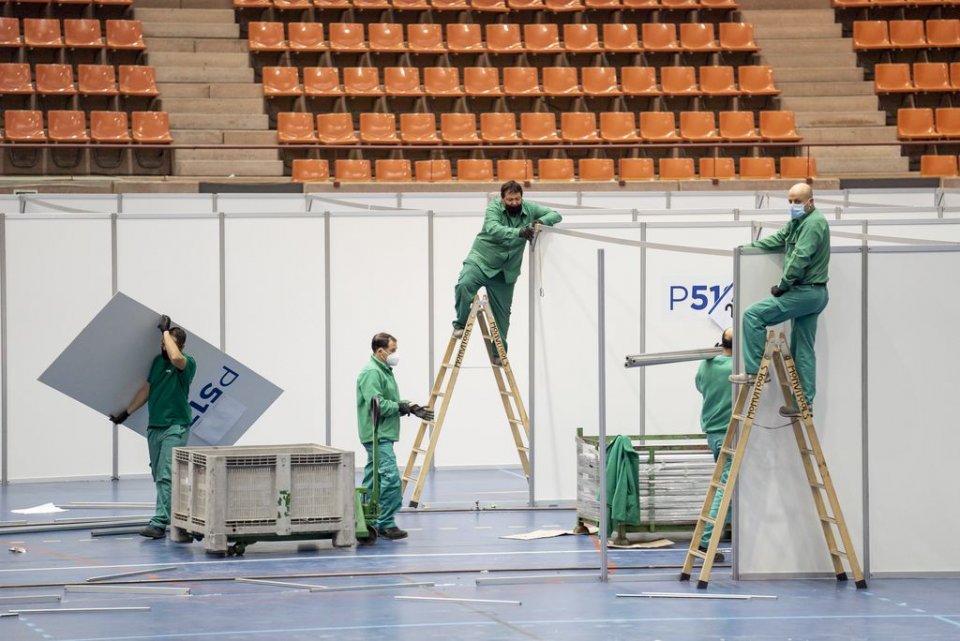Latest: Coronavirus in Spain figures (11 Mar)
ALSO READ: Details of curfews & restrictions for all regions of Spain during ‘State of Alarm’
Please support Spain in English with a donation
Click here to get your business activity or services listed on our DIRECTORY
Report below updated in Spain at 19.15h on Fri 5 Mar
CORONAVIRUS in SPAIN – latest Health Ministry figures
The latest official figure released by the Spanish Health Ministry on Friday 5 March for the number of people who have tested positive for Coronavirus since the start of the pandemic is now 3,149,012. This is an overall increase of 6,654 against the figure released on Thursday. The ministry claims that 2,921 cases have occurred in the past 24 hours.
The peak of recorded infections for a 24-hour period during this ‘third wave’ of the pandemic in Spain was on 21 January, when 18,504 cases were registered. During the ‘first wave’, it was on 31 March when 9,222 cases were registered.
Thursday had seen an overall increase of 6,037 cases over Wednesday, with the ministry claiming that 2,676 had occurred in a 24-hour period. Wednesday had seen an overall increase of 6,137 over Tuesday, yet 3,021 in 24 hours.
The overall incidence rate for Spain is now 149.23 per 100,000 inhabitants for the past 14 days. It is under 150 for the first time since last summer, and which means the country is out of the ‘high risk’ level . Yesterday it was 153 and last Friday 193. It is at its lowest in Extremadura (44), followed by the Balearic Islands (61), La Rioja (74), the Valencia region (79), Murcia (83) and Castilla La Mancha (87).
There have now been 70,179 cases of Coronavirus detected in the past 14 days – out of the total 3,149,012. The figure for the past 7 days is 30,088.
There are currently 9,896 people requiring hospital treatment for Covid-19 in Spain, of which 2,571 are in intensive care. This represents 25.14% occupation of intensive care units (ICUs) by Covid-19 patients across Spain. It is at its highest in Madrid at 40%, followed by Catalonia at 37%.
The official figure for the total number of Coronavirus-related deaths on Friday 5 March is now 71,138 – an increase of 637 since Thursday, owing also to a readjustment of the data from Catalonia. It is now a total of 633 deaths in the past 7 days.
The highest increase of deaths for a 24-hour period during this ‘third wave’ in Spain was on 9 February when 766 were registered. The peak of deaths during the ‘second wave’ was on 24 November when 537 were registered. During the ‘first wave’ it was on 2 April when 950 were registered.
Vaccinations given
Latest figures (up to 5 March) show that Spain has received 5,583,955 doses of Covid-19 vaccines (from Pfizer-BioNTech, Moderna and AstraZeneca), and that 4,471,577 jabs have been administered. This is 80.1% of total vaccines received. 1,342,485 people have now received a second jab. In a separate report, we have published the amount of vaccines received and administered for each region in Spain. Latest: Covid-19 Vaccinations in Spain
Increase in infections per region
Of the 2,921 new infections claimed by the Health Ministry to have only been registered in the past 24 hours on Friday 5 March, the numbers per region are as follows:
- 1,049 in Madrid (last 24 hour increase was 1,122)
- 283 in the Basque Country (31)
- 190 in the Canary Islands (158)
- 187 in Castilla y León (223)
- 175 in the Valencia Region (135)
- 172 in Andalusia (191)
- 170 in Aragón (177)
- 159 in Asturias (135)
- 122 in Catalonia (138)
- 82 in Galicia (77)
- 78 in Murcia (56)
- 71 in Navarra (62)
- 43 in Cantabria (37)
- 29 in the Balearic Islands (21)
- 24 in Extremadura (34)
- 24 in Castilla La Mancha (28)
- 19 in La Rioja (19)
- 19 in Ceuta (11)
- 25 in Melilla (21)
A full breakdown of the data per region, together with age group statistics can be found by clicking here.

Covid-19 Vaccination Strategy in Spain
Since 27 December, Spain has been administering jabs against Covid-19, first using the Pfizer/BioNTech vaccine, then from 13 January also with the Moderna vaccine. The AstraZeneca vaccine has also been used from 9 February but it is not being administered to citizens aged over 55.
The second phase of Spain’s three-phase Vaccination Strategy has now started, although the government and regional health authorities have adapted the initial plans to changing circumstances. For our most recent report on the groups during the second phase, click here: Spain will administer AstraZeneca vaccine to 45-55 year olds in 2nd phase. For the latest data on the number of vaccines received and administered per region in Spain, click here: Covid-19 Vaccinations in Spain
Current ‘State of Alarm’ – restrictions across Spain
Spain voted to extend its current State of Alarm until 9 May 2021. The State of Alarm was initially declared last October to enable the regional governments the legal requirements to impose and enforce nighttime curfews and other restrictions, where required. Full details here: New ‘State of Alarm’ in Spain.
In a separate report and being regularly updated, we have detailed all the curfew times and key restrictions in place for each region of Spain. Most regions have issued border closures and there are many municipality confinements. Many regions have also restricted the opening hours of bars and restaurants, or ordered their closure. Click here: Details of curfews & restrictions for all regions of Spain during ‘State of Alarm’
Covid-19 test requirements for travellers arriving to Spain
Also read: Spain suspends flight arrivals from UK, except for Spanish citizens and residents
Spain changed the Covid-19 test requirements for travellers arriving to the country from Thursday 10 December, via airports or ports. Since Monday 23 November, travellers arriving in Spain from high-risk countries had to show proof of a negative PCR test done within 72 hours of arrival. A negative result from a TMA (Transcription-Mediated Amplification test) is now also valid, ‘and other tests based on equivalent molecular techniques’. Full report here: Spain changes Covid-19 test requirements for travellers.
Click here for all previous reports on: Coronavirus in Spain
ALSO READ: Details of curfews & restrictions for all regions of Spain during ‘State of Alarm’
Sign up for the FREE Weekly Newsletter from Spain in English
Please support Spain in English with a donation.
Click here to get your business activity or services listed on our DIRECTORY



